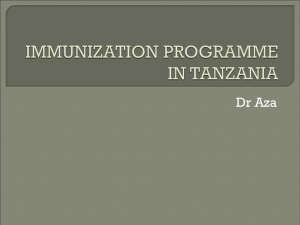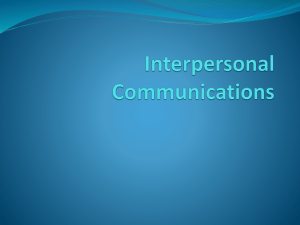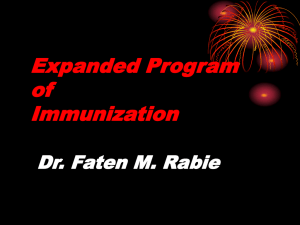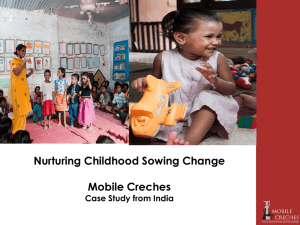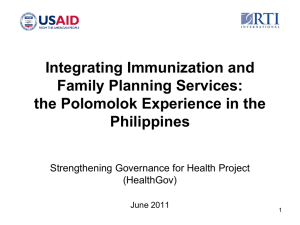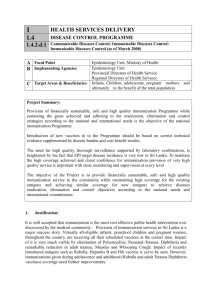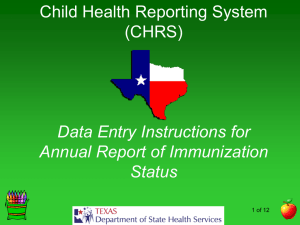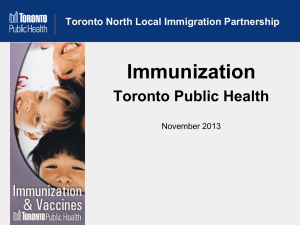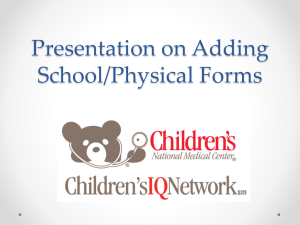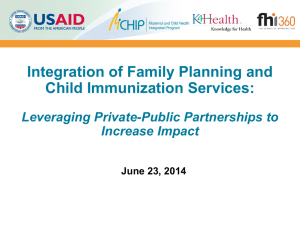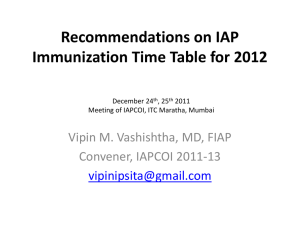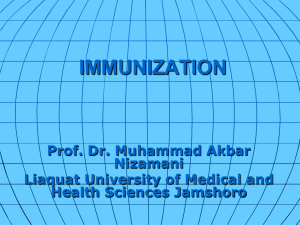NITAG Resource Center - Global Vaccines 202X
advertisement
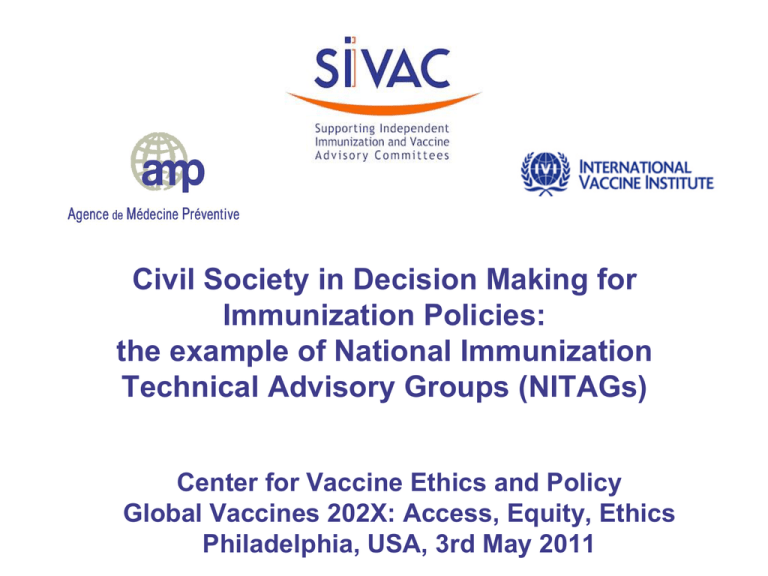
Civil Society in Decision Making for Immunization Policies: the example of National Immunization Technical Advisory Groups (NITAGs) Center for Vaccine Ethics and Policy Global Vaccines 202X: Access, Equity, Ethics Philadelphia, USA, 3rd May 2011 About the SIVAC Initiative • The SIVAC Initiative assists in the establishment or strengthening of functional, sustainable National Immunization Technical Advisory Groups (NITAGs) in GAVI-eligible and middle-income countries. • The aim is to enhance the use of evidence-based decision making in the development of immunization programs and policies. • SIVAC provides support in the form of technical assistance, briefings, tools development, and information sharing. • SIVAC is a program of the Agence de Médecine Préventive (AMP), an intrenational non-profit organization that links and mobilizes resources to address the needs of developing countries in the area of infectious diseases. • SIVAC is funded by a generous grant form the Bill & Melinda Gates Foundation About the SIVAC Initiative • SIVAC Initiative's major activities are: • • • • • To establish partnerships within the immunization community to support NITAGs’ activities To assist in the creation of new NITAGs To strengthen existing NITAGs To support a regional approach to generalize the establishment of NITAGs in West Africa Knowledge sharing (including the NITAG Resource Center) New context for immunization • New and complex context for Immunization • New vaccines, new compositions, new presentations, and new indications and …Future vaccines • Diversity of vaccine providers with lower price • But… • Multiple health priorities, limited human resources and logistical capacities • Expensive vaccines with limited funds available • An expressed need for National adaptation of Global and Regional recommendations to take into consideration local realities New context for immunization • But… • Immunization and Vaccines outside from EPI: Absence of recommendations for some groups such as persons consulting the private health sector, military personnel, workers, tourists, school children, adolescents… • Limited mandate of Inter-agency Coordinating Committees (ICCs) - Focus on EPI - Mostly In GAVI eligible countries only - Primarily operational coordination mainly on resources (proposals, annual progress reports, annual work plans…) - Some ICCs have technical sub-committees A global recommendation to establish NITAGs • WHO-UNICEF Global Immunization Vision & Strategy GIVS 2006-2015 • Numerous successful existing national independent committees • Thailand, China, Sri Lanka, USA, Canada, Australia, South Africa, UK, France, Brazil… • WHA 61.15 (2008), “WHA requests the DG to…strengthen national capacity for making evidencebased policy decisions to adopt new vaccines” • WHO SAGE Recommendations, • Specific WHO Regional Offices recommendations (16th WHO AFRO TFI, WHO SEARO, WPRO, EMRO, EURO) About the NITAGs TECHNICAL ADVISORY SAGE REGIONAL COMMITEE FINANCIAL AND OPERATIONNAL GAVI BOARD REGIONAL ICC ? ICC MoH MoH & MINFI About the NITAGs • What is the role of a National Immunization Technical Advisory Group (NITAG)? • Guide policy makers and program managers to make evidence-based immunization related policy decisions • To provide some technical recommendations for all vaccine preventable diseases to National authorities • This is NOT serving as an implementing, coordinating or regulatory body • Only the National authorities are making the final decision. About the NITAGs About the NITAGs • What are the areas covered? • • • • • • Vaccine quality and safety, Immunization policy and strategies (EPI and outside EPI) Introduction of new vaccines and immunization technologies Maintaining a high routine immunization coverage Promoting national vaccine security in procurement Guiding national authorities on the public health needs for new and emerging vaccine-preventable diseases. = all the topics in the Immunization and Vaccines areas for which MoH needs technical and scientific advices. About the NITAGs • Why having national experts from the Civil Society? • • • • • • • • • • • Ensuring a proper dissemination Ensuring sustainability Empower national authorities Ensure a comprehensive and integrated approach Create a neutral forum Ensure the credibility of decision making process Help resist pressure form interest groups Representing a broad range of disciplines Senior pediatricians, epidemiologists, public health experts, health economists, vaccinology experts, social scientists etc. Ex-officio (not voting) : MoH different division Liaison members (not voting) : WHO, UNICEF, NGOs… Challenges for a NITAG • “Independent expertise" • Transparency of the process • Quality of the recommendations (evidencebased, experts) • Human resources (experts and the executive secretariat) • Recognition from the MoH (endorsement of the recommendations…) • Recognition from the global Immunization community of the NITAG (WHO, Unicef, NGOs, Funders…) What is expected to be in place in 202X? • Countries are able to make their own decisions regarding Immunization policies through Efficient and Sustainable NITAGs • Where expertise is available • Where National Authorities are supportive to independent process for decision making (strong Civil Society, democratic models) • Strong Technical Partnerships • Between NITAGs and between NITAGs and the Global Immunization Community • To ensure that recommendations are evidence-based What is expected to be in place in 202X? • Strong collaboration between SAGE, RTAGs and NITAGs • NITAGs activities have • Shaped the National Research agenda • Strengthened the need for Evidence based decision making in Health Area • Advocated the need for the increase of National Spending for Immunization Websites and Contacts NITAG Resource Center http://www.nitag-resource.org/ SIVAC Initiative http://www.sivacinitiative.org/ AMP http://www.aamp.org Contact us: Dr Kamel Senouci, Director SIVAC Initiative ksenouci@aamp.org
